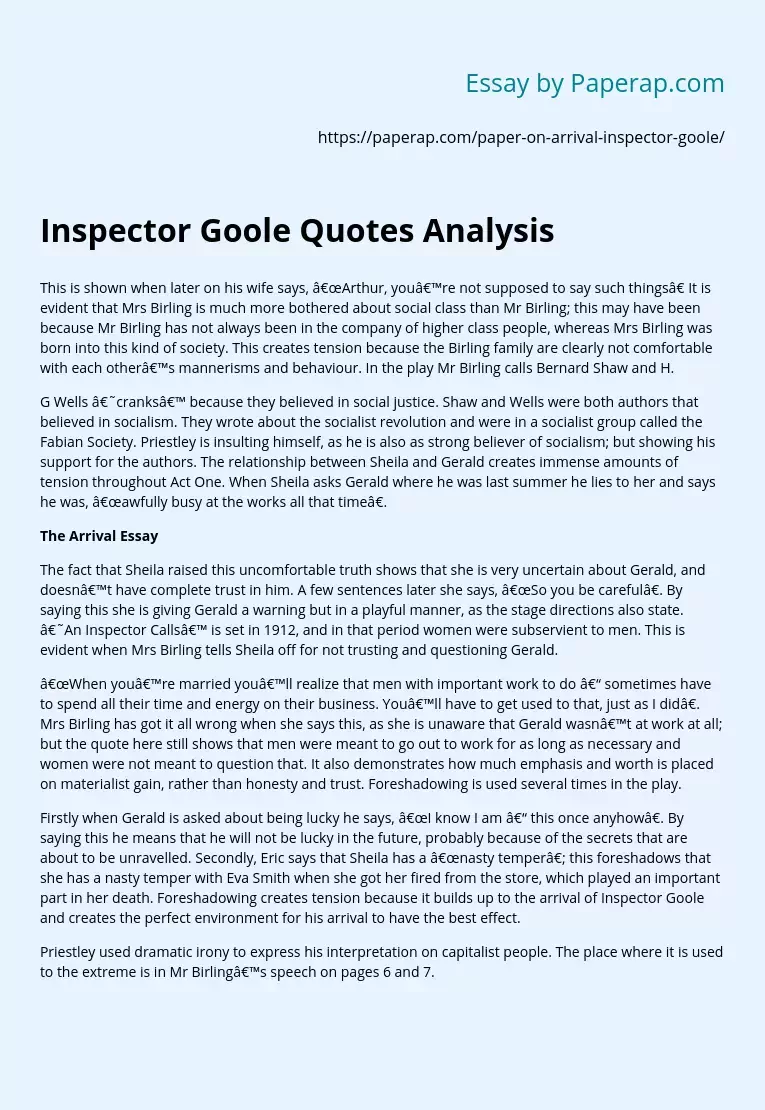Inspector Goole Quotes Analysis
This is shown when later on his wife says, “Arthur, you’re not supposed to say such things” It is evident that Mrs Birling is much more bothered about social class than Mr Birling; this may have been because Mr Birling has not always been in the company of higher class people, whereas Mrs Birling was born into this kind of society. This creates tension because the Birling family are clearly not comfortable with each other’s mannerisms and behaviour. In the play Mr Birling calls Bernard Shaw and H.
G Wells ‘cranks’ because they believed in social justice. Shaw and Wells were both authors that believed in socialism. They wrote about the socialist revolution and were in a socialist group called the Fabian Society. Priestley is insulting himself, as he is also as strong believer of socialism; but showing his support for the authors. The relationship between Sheila and Gerald creates immense amounts of tension throughout Act One. When Sheila asks Gerald where he was last summer he lies to her and says he was, “awfully busy at the works all that time”.
The Arrival Essay
The fact that Sheila raised this uncomfortable truth shows that she is very uncertain about Gerald, and doesn’t have complete trust in him. A few sentences later she says, “So you be careful”. By saying this she is giving Gerald a warning but in a playful manner, as the stage directions also state. ‘An Inspector Calls’ is set in 1912, and in that period women were subservient to men.
This is evident when Mrs Birling tells Sheila off for not trusting and questioning Gerald.
“When you’re married you’ll realize that men with important work to do – sometimes have to spend all their time and energy on their business. You’ll have to get used to that, just as I did”. Mrs Birling has got it all wrong when she says this, as she is unaware that Gerald wasn’t at work at all; but the quote here still shows that men were meant to go out to work for as long as necessary and women were not meant to question that. It also demonstrates how much emphasis and worth is placed on materialist gain, rather than honesty and trust. Foreshadowing is used several times in the play.
Firstly when Gerald is asked about being lucky he says, “I know I am – this once anyhow”. By saying this he means that he will not be lucky in the future, probably because of the secrets that are about to be unravelled. Secondly, Eric says that Sheila has a “nasty temper”; this foreshadows that she has a nasty temper with Eva Smith when she got her fired from the store, which played an important part in her death. Foreshadowing creates tension because it builds up to the arrival of Inspector Goole and creates the perfect environment for his arrival to have the best effect.
Priestley used dramatic irony to express his interpretation on capitalist people. The place where it is used to the extreme is in Mr Birling’s speech on pages 6 and 7. Birlings comments on how the Titanic is unsinkable, “The Titanic – she sails next week – forty six thousand eight hundred tons – forty six thousand eight hundred tons – New York in five days time – and every luxury – and unsinkable” This makes Mr Birling seem stupid, as the audience already know the Titanic did sink.
He also states, “I say there isn’t a chance of war” and talks about that for quite a long time. He seems very certain about the opinions he is saying, but is oblivious that they are all to be proved wrong. This is the kind of impression that Priestley would have wanted to make on his audience; that they thought Mr Birling was a stereotypical capitalist person who is very immature with what he says. Eric is a particularly symbolic character. The way he is seated at the dining table, as mentioned earlier, already suggests his distance from the family.
Just before Eric enters the room Mr Birling says, “And you can promise her that we’ll try to keep out of trouble during the next few months” This is very symbolic because it is suggesting that Eric has been getting into trouble, which is later to be revealed that he has. When the inspector is first mentioned at being at the front door the atmosphere changes completely. You can tell that everyone is getting nervous and suspicious. This shows when Gerald jokingly accuses Eric of being up to something and Eric says, “Here what do you mean?
” Here he is getting defensive and protective of himself; as if he has something to hide. Mr Birling picks up on this and asks him, “What’s the matter with you? ” in a sharp, assertive manner. In conclusion, I think that Priestley has built up tension very successfully. He has set a perfect environment for the Inspector to arrive in. There are many techniques that are used to contribute to the tension built in the play. In my opinion; the characters actions build the tension best by the way they are seated and what they are wearing. This is because I think that this is where the distance and formality is most evident.
My favourite dramatic device used in the play is foreshadowing; this is because Priestley is giving away subtle indications of what is going to happen as the play goes on. I couldn’t pick the most effective way Priestley creates tension, as they all work together to build tension in the best possible way. Show preview only The above preview is unformatted text This student written piece of work is one of many that can be found in our GCSE J. B. Priestley section.
Inspector Goole Quotes Analysis. (2019, Dec 05). Retrieved from https://paperap.com/paper-on-arrival-inspector-goole/

